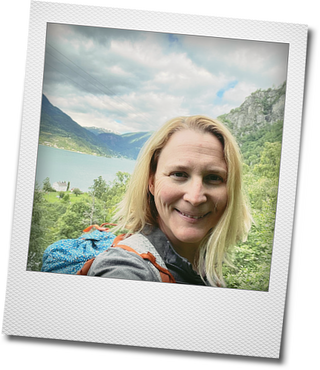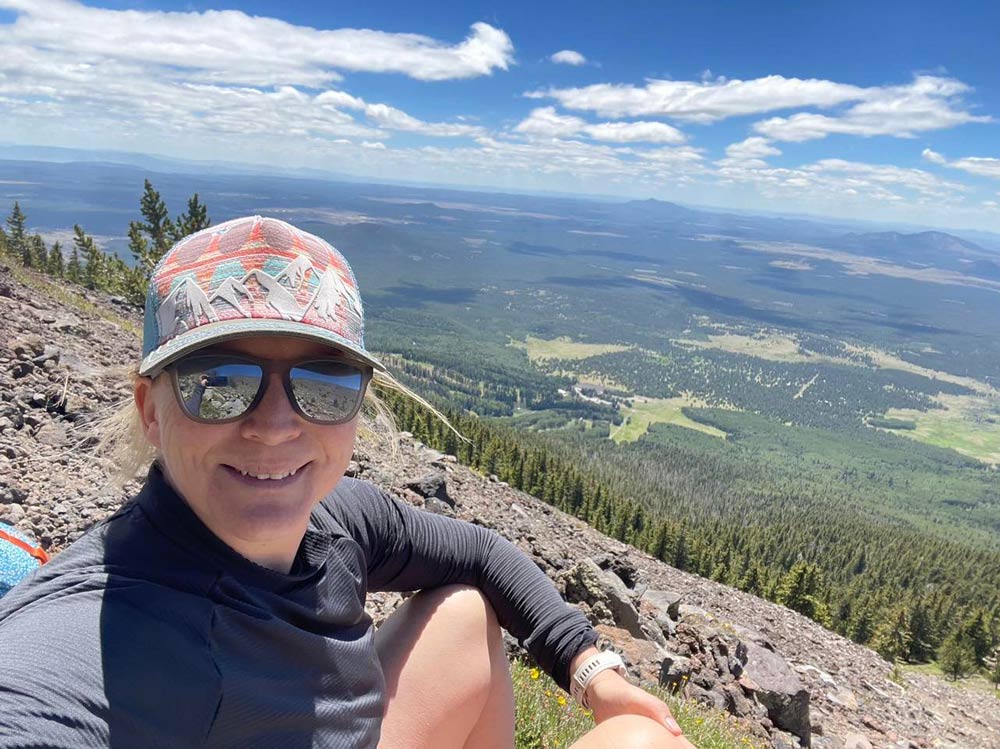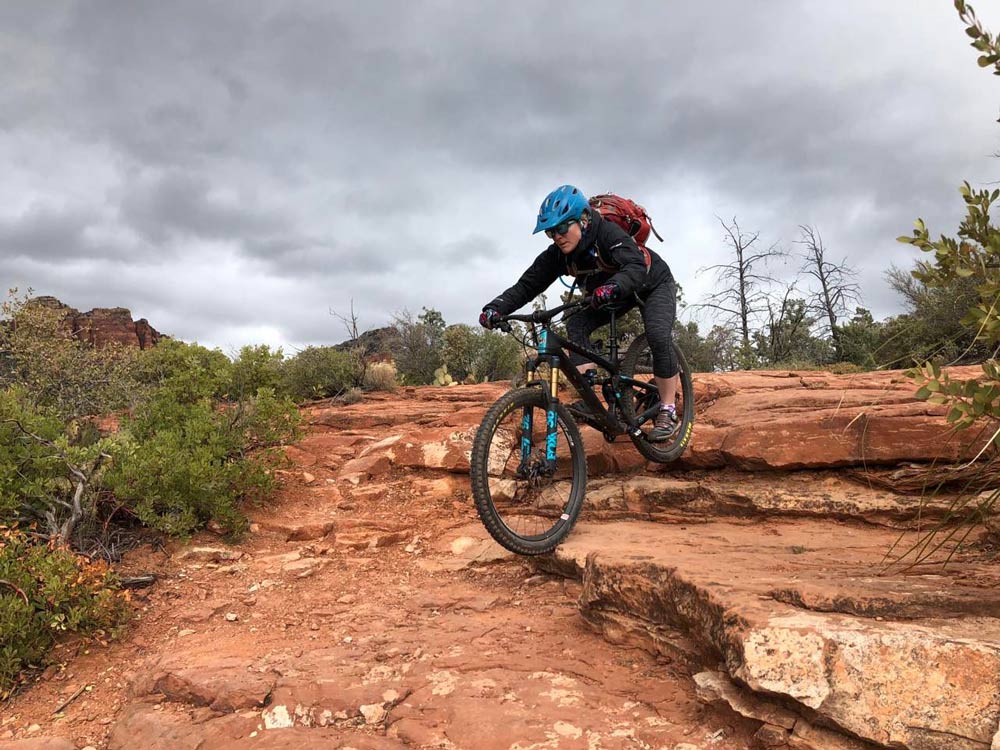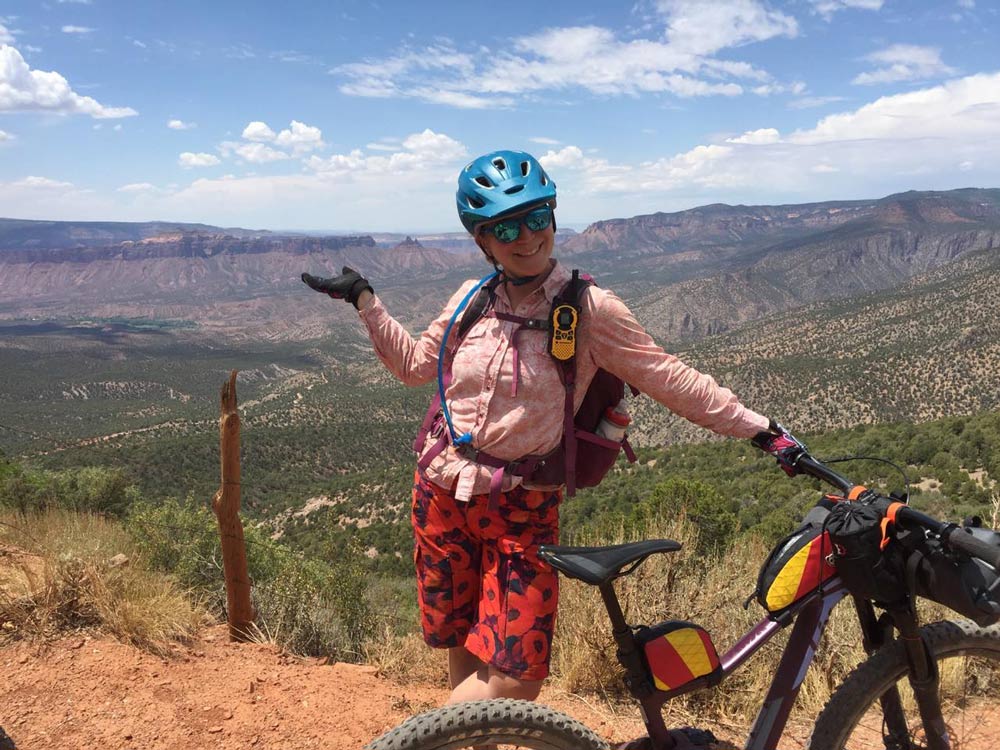Sabrina Carlson lives in Flagstaff, AZ USA. It was 10 years before they received their ‘official’ ankylosing spondylitis diagnosis. They use animal based starch free diet and lifestyle to manage their AS and most days they are 80-90% pain free. ⚙️ See Sabrina’s Wellness Plan here
“Before changing my diet, I was concerned I would end up in an extended care facility by my 50’s. Daily life was a struggle. Now I’m handling most daily life very well and have even been able to add back some of the physical activities I used to enjoy.”
When did you first start experiencing AS symptoms and what were they?

If I think about it, I very first experienced discomfort in my SI area during a bout of Pneumonia when I was about 20 years old. That would have been 24 years ago now. But the symptoms really started to emerge around 2013 when I was pregnant with my son and after his birth.
When did you receive your ‘official’ AS diagnosis?
March 2023. Official diagnosis is Non radiographic Spondyloarthritis. Which as I understand it, is basically an early stage AS.
Did you test positive for the HLA B-27 gene variant?
I did not. I’m HLA B-27 negative. Which I guess is more common for women and for NR SpA.
Did you have any blood inflammatory markers tested during your diagnosis journey?
Not a single one! This is probably part of why diagnosis took so long to achieve.
What was your experience getting a diagnosis?
I’ve spent a solid decade telling doctors that I had this pain, brain fog, fatigue and have gotten every response from “It’s all in your head/not real” to it just being ‘mom-brain” and the realities of a post childbirth body. I was told Chronic Fatigue Syndrome (Which is a diagnosis that means nothing really. Just “you are really tired a lot and we don’t know why”) I was told Adrenal Fatigue. Nutritional Deficiencies. You name it.
But about three years ago the pain portion of my symptoms became so severe I was bent double at times. Hardly able to walk. Couldn’t bend over to put on shoes or pick things up off the floor.
The exhaustion was exacerbated by the extra fatigue of being in pain all day. I took out long term care insurance for myself, certain that whatever this was would land me in need of assistance sooner than later.
I tried everything I could think of. Body work, massage, tens unit, chiropractor, hiring a personal trainer, pilates, hot tubs, sauna, working with a functional medicine doctor and a health coach, repeat MRI and x-ray of the lumbar spine at the orthopedist. Even starting HRT thinking this might be age related.
Some of these interventions helped a little for short periods of time. But nothing was fixing it.
Then in October of 2022 I was home sick and googling if a certain cough medicine was safe for me with asthma. The health website I was on happened to serve me an article titled “When might your back pain might not be just back pain”. The article described an autoimmune condition called Ankylosing Spondylitis for which I had every. Single. Symptom.
One specialty I had never consulted yet was a Rheumatologist. Because I had zero point of reference for even what a Rheumatologist does or the fact that what I experienced might require such a specialty.
We have only one Rheumatologist in our entire city, so it took 5 months to even get in for an initial appointment. Then several months of back and forth to settle on the NR SpA diagnosis.
During this period I was determined to simply act “as if” and learn every dietary and lifestyle intervention that might possibly be helpful for AS. That led me ultimately to the Low/No starch Facebook group and this way of eating.

How long did your road to diagnosis take once you were ‘in the system’?
Once in with the Rheumatologist, it took about 2 months and 3 office visits. But prior, it had just been dead ends and distractions for 10 years.
What has your experience with rheumatologists been like?
Thankfully, our one Rheumy in town here is really great.
He’s fairly up on the gut/AS connection and they are very aware of the unusual was this disease presents in women. I’m sure that is why They were able to pin it down so quickly even with “perfect” blood work and no obvious fusions yet.
At this point I plan to delay starting of any biologics just yet to give myself more time to heal with holistic means. I’m hopeful the office will be willing to monitor my disease state even if I decline their preferred treatment, but I don’t know for sure yet.
What medications have you tried prior to trying the diet and how effective were they?
OTC Anti Inflammatories mostly. They helped a little. But never got rid of the pain 100% and always cause major gut distress.
Before you started managing your ankylosing spondylitis, typically how many times a year would you go in flare and how long did they tend to last?
I’m not really sure I can say I was ever not in some level of flare. But over the 10 years this disease has been more active, I’ve been in a more significant flare about 5 of those years total. Each flare being more severe than the one before and lasting longer.
What was your darkest point with your AS?
Probably right before finding that article online. I was in so much pain and absolutely NO idea what to do or how to fix it. I saw a long, joyless, exhausting life before me with no hope.
Now that you are following your own AS wellness plan, typically how many times a year do you go and flare and how long do they tend to last?
I have only been doing this about 6 months. I’d say about once a month I’ll have a slightly higher pain time that lasts about a week. But those get shorter, less intense, and less frequent over time.
What are your five top Wellness protocols for managing your AS?
⚙️ Animal based starch free diet – As close to carnivore as I can tolerate yields best results. But I do eat some starch free plants here and there and use low starch and AIP seasonings.
This has been 80-90% effective so far.
⚙️ LDN – My Functional doc started me on LDN for the immune modulating effects.
This has helped reduce inflammation about another 10%
⚙️ Walking pad under my standing desk – Sitting still all day is a killer. Having the option to walk for periods of time while working is a game changer. It doesn’t really help heal the disease at all.
But it certainly makes me feel about 50% less crappy by the end of the day.
⚙️ Body work – I don’t even know exactly how to describe what Jesse does. His licence is massage therapy. But what he does isn’t that. He finds various points on my body to push on the release tense areas an help move inflammation through. This was really one of the top things that helped with symptom management before we knew what I was dealing with.
At the time it would give me about 50% pain relief after each visit. And though it might only last a day or two it saved me. I now go twice a month for maintenance.
⚙️ Pilates/Postural Restoration therapy – These are two different movement modalities, both of which have helped me strengthen and relax muscles that are overstressed due to the inflammation.
I’d say this has added about a 10% help with my overall plan.

What other wellness protocols do you use to manage your diet?
I find that mostly Carnivore helps the AS symptoms the most right now. I hope to be able to tolerate more plant foods more frequently in the future.
I’m currently learning about how mold toxicity and CIRS might be a root cause for a lot of autoimmune arthritis conditions too. Stay tuned for that.
How long did it take before the diet started having an effect?
I noticed a major decrease in pain after four days. But changes have been very small and incremental since.
What were your biggest challenges with the diet?
My partner and I are both huge foodies and love to eat out at fancy restaurants. That has been difficult to just not worth it.
Losing that joy in our lives has been really really tough. We do go out occasionally now, but I am almost always disappointed in my meal compared to the same thing at home.
What do you think your loved ones found most challenging about your diagnosis? How did they feel about your diagnosis?
Holding space for my pain, exhaustion and lack of capacity has been hard on them. When in my worst pain, I’m a terrible person to cohabitate with. I just don’t have the physical ability to help with cleaning and home maintenance that makes for a fair division of labor.
Also, my natural state is a very active, happy, and positive person. This disease at its worst made those descriptors nearly non existent for me. Which I know was very hard on my partner and child.
Since starting the diet, needing to plan all food around mom’s diet is a giant pain for everyone. But we are adapting. And especially now that the diet is working, and the old me slowly emerging again, it makes the inconvenience of the diet less irritating for everyone else.
What did they find most challenging about your diet and wellness protocol?
Obviously, not being able to eat out and having to have a strict regime was hard on them. But I think my partner especially worried about how stressful it was on me at first and worried about the lack of plants/fiber and increase in saturated fat.
What I eat goes against every conventional wisdom about diet and nutrition. So that was really hard for them to be worried about.
What helped them?
Seeing my progress and improvement. Now my spouse will tell people about “this wacky diet” I have to be on and how he thought it was bonkers at first. But its totally working and he is so happy.
What would you tell others thinking about trying the diet that you wish you knew now?
Don’t overcomplicate it.
Even though eating just meat, or just meat and short list of plant foods for a while sounds stressful and boring, there is a lot of freedom in it. No more stressing about what you will eat at the next meal or calibrating exact nutrient ratios. Eat meat, and maybe a few low toxicity plants and lean into the simplicity of that.
Most useful resources you’ve come across online
🔗 The Low/No Starch group for sure.
🔗 Starch Free Feasting for recipes.
Anything else you’d like to share with your fellow AStronauts?
There is hope. Be persistent. No one will care about YOUR health as much as you. Don’t just take the diagnosis and statements that this is a lifelong hellscape that you can’t escape. You CAN.
There is so much more that you can do to manage and slow your disease than has been published in research yet, and likely even more things that we haven’t found at all yet. Put on your pump up music and get after it. There is so much hope.

You can find Sabrina’s Wellness Plan here:

This is fantastic, Sabrina. Thanks so much for sharing your inspirational story